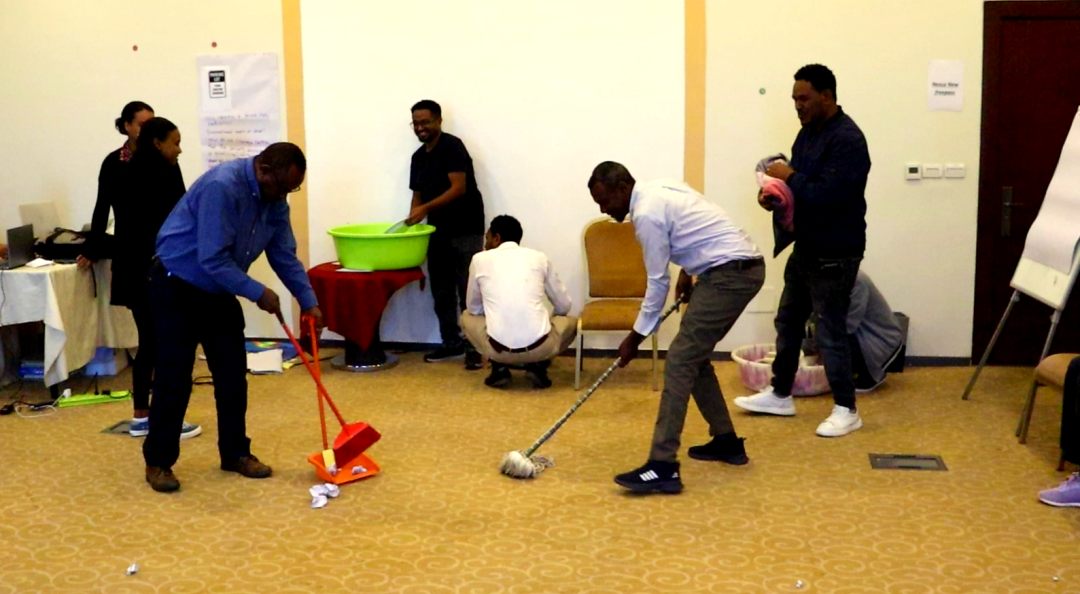In today’s society, promoting gender equality and inclusion is crucial. One effective approach is to provide staff training on gender transformative methods. By equipping staff with the knowledge and skills to address the root causes of gender inequality, a more inclusive and empowering environment can be created for all. As part of the effort to integrate gender transformative approaches in research for food system transformation, SWR Ethiopia collaborated with CARE Ethiopia to conduct a 5-day trainers’ training on the Social Analysis and Action approach. The training brought together 22 RAISE-FS project-implementing staff from national and regional project offices, partner universities, and agricultural research centers. The aim of the training was to enable partners to recognize gender-related biases, stereotypes, and discriminatory practices that may impact their work outputs and interactions with the community. Additionally, it aimed to increase their confidence in facilitating gender equality-related dialogues with others.
The SAA training employed several participatory tools and adult learning methodologies. Through the different tools, partners were able to explore the differences between gender and sex, how social norms shape peoples’ beliefs, relations, decisions, and life choices, and why it is important to work with norm keepers to challenge restrictive norm keepers. One important tool was the gender equality framework, that illustrated the importance of working in the three pillars: building agency, changing relations, and transforming structures.

The ‘Power Walk’ was another powerful exercise in which participants practiced “walking” in someone else’s shoes and experienced what it feels like to be powerless or powerful based on different factors. The exercise helped participants comprehend concepts like inclusions, intersectionality, and discrimination. With the ‘Vote with your feet’ exercise, project staff explored their beliefs about different issues like gender equality, social norms, gender roles, gender-based violence, etc. in a game-type format to help them question some of their values, biases, perceptions, and misunderstandings and help them understand how personal experiences and values impact the decisions and outcomes of their personal as well as professional lives.

Sirinka ARC
I would say it is my first time to have participated in such type of training. The comprehensive nature of the training has equipped me with invaluable knowledge of various gender analysis tools and methods. Understanding how to ensure the inclusion of all members of the communities in development initiatives is paramount, and the training has provided me with a solid foundation in this regard. This newfound understanding will undoubtedly will help me play a greater role to enhance the implementation of RAISE-FS project activities, ensuring a more inclusive approach. Moving forward, I am eager to apply these newfound skills and knowledge to drive positive change within my sphere of influence, fostering inclusivity and empowerment.
The TOT included a crucial component on facilitation skills, which taught participants the essential attributes of SAA facilitators. A key component of the SAA process, trust was demonstrated during the training. With the use of various interactive approaches, the vital characteristics of SAA facilitators were made even clearer.
The final day of the training focused on ‘male engagement’ exercises. In the ‘me and my spouse’ exercise, volunteer male trainees were made to physically demonstrate traditionally female domains of domestic work like cooking, cleaning, and child care. After this exercise, participants shared what they learned. One male participant said the following:

To wrap up, the participants regrouped with their regional teams to collaborate on hypothetical cases for action planning. They analysed the cases, formulated actionable plans, pinpointed factors that may impact the implementation of these plans, and proposed RAISE-FS interventions aimed at providing support to the communities at various levels.
The way forward
While I have received similar training in the past, this particular training stood out due to its wide-reaching scope and unique approach. Unlike previous trainings which predominantly focused on gender mainstreaming, this program explored the broader spectrum of social issues, specifically challenging and addressing complex social norms. The comprehensive nature of this training not only enriched my understanding of community dynamics but also prompted a profound revaluation of my own life from a fresh perspective. One of the most impactful takeaways from the training is the realization that our role extends beyond providing solutions to the community; it also involves empowering them to identify and shape their own solutions.

Debrezeit Agricultural Research Centre
Individuals biased attitudes and practices on gender equality, not only prevent the development of a gender-equitable workplace but also ultimately result in gender discriminatory outreach. As RAISE-FS is planning to integrate gender transformative approaches in its interventions, the TOT is a leap forward toward this journey. Going forward, a series of action and learning platforms will be set up at institutional as well as community levels to take forward the issue of gender equality and women’s empowerment. Let us leap together towards a more equitable food system where everyone has equal opportunities to thrive.


